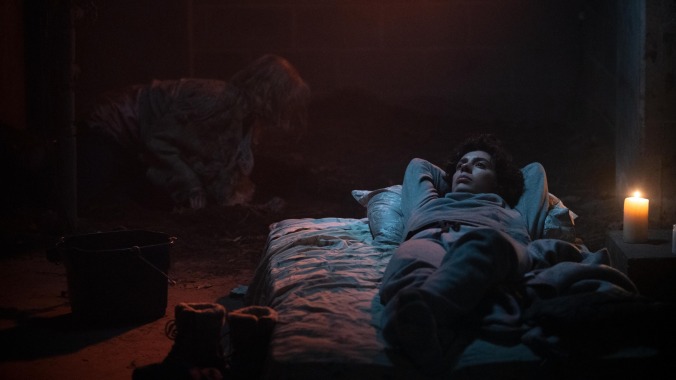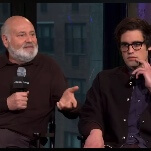That would be the series’ best episode, “Plainfield, IL,” which tweaks Ballingrud’s story “The Good Husband” to be about a lesbian couple, Kate (Taylor Schilling) and Shawn (Roberta Colindrez). Other than that, the dynamics remain intact, using a zombie-movie premise—Kate, who has a long history of bipolar illness, dies by suicide, then reanimates as a walking corpse decaying before her wife’s eyes—to explore bleak themes of marriage, guilt, and codependency. Many stories stemming from this premise would linger on exploring Shawn’s grief, and indeed, it is a very sad hour of television. But through Colindrez’s outstanding performance, director Logan Kibens draws out the thorny subtleties of Kate and Shawn’s relationship, asking whether refusing to let go might be bad both for the one leaving and the one left behind.
A similar emotional complexity marks “Newark, NJ,” another story about loss starring Luke Cage’s Mike Colter and When they See Us’ Adepero Oduye as the parents of a little girl who disappeared nearly a year before the story begins. Amy (Oduye) needs closure, but Brian (Colter) cannot accept that his daughter may never be coming back. That puts a strain on their marriage, one that receives supernatural intervention when Brian finds one of the aforementioned angels shivering and injured in a dumpster. (In this series, the angels look less like radiant androgynes and more like aliens from The X-Files.) Powerfully acted and culminating in a surreal, moving final sequence, “Newark, NJ” is a redemption of sorts for director Babak Anvari: He’s clearly a fan of Ballingrud’s, given that his film Wounds (2019) was also based on the author’s work. But where that film was half-baked and off-putting, “Newark, NJ” just clicks.
The remaining six episodes of Monsterland aren’t as stunning as those two, but, for the most part, they’re still quality work. Only two episodes—“New Orleans, LA” and “New York, NY”—fail to strike the right balance between their uncanny elements and their human ones, tipping into rubber-mask artifice that undermines their emotional power. “New Orleans, LA” in particular squanders the acting talents of Nicole Beharie on a clichéd demonic jazzman, although Beharie brings everything she’s got to the role.
On the whole, the casting in Monsterland is excellent, giving under-appreciated actors like Beharie, Kelly Marie Tran, and Kaitlyn Dever meaty leading roles. For her part, Tran gets to explore her wicked side as a good girl with a dark secret in the true crime-obsessed Rashomon riff “Iron River, MI.” And series opener “Port Fourchon, LA” places Dever—the unofficial mascot of the show, and the only character to show up in multiple episodes—at the center of a cyclone of emotions as a diner waitress and single mom whose toughness and cynicism belie her young age. Those traits come in handy when she encounters a serial killer played by Jonathan Tucker, however, establishing Monsterland’s place at the intersection between the human and the monstrous in suitably creepy style.
The roster of directors is impressive as well, featuring talents like The Miseducation Of Cameron Post’s Desiree Akhavan, The Eyes Of My Mother’s Nicolas Pesce, and Super Dark Times’ Kevin Phillips alongside Anvari, who also serves as an executive producer. Each of these directors is matched with a story that reflects their strengths: Pesce, loneliness and body horror in the vicious mermaid tale “Palacios, Tx;” Phillips, adolescent male angst and shadow monsters in “Eugene, Or.” It speaks to the clarity of Laws’ vision how thoughtfully she’s put together these ensembles. And although Monsterland does suffer from the unevenness that seems to be inherent in all anthologies (horror or otherwise), its highs are among the best genre work of the year.

























![HBO teases new Euphoria, Larry David, and much more in 2026 sizzle reel [Updated]](https://img.pastemagazine.com/wp-content/avuploads/2025/12/12100344/MixCollage-12-Dec-2025-09-56-AM-9137.jpg)
















